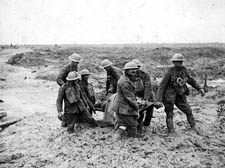|
|
 |
| |
 Stretcher bearers in Passchendaele, August 1917 Stretcher bearers in Passchendaele, August 1917 |
Last Post echoes from the trenches
Gerald Isaaman on an anthology of soldiers’ stories marking 90 years since the end of the Great War
For King and Country: Voices from the First World War.
By Brian MacArthur.
Little, Brown £20. order this book
I REMEMBER as a lad sitting in the pilot’s seat of a shot down Junkers 88 in a field outside the Spitfire station at RAF Wittering near Peterborough – the place where the abused boys in blue have just been told to take off their uniforms when going into town – while evacuated in the last war.
I dived under a hedge when a buzz bomb stopped overhead in north London and saw the devastation of a V2 rocket after a night in the shelters. My uncle Sammy I never knew because he was killed in the First World War.
My wife’s family have dramatic stories to tell that have taken us to France to hear the haunting sound of a Scottish piper as he led his returning regiment over the old poppy fields of Flanders. Now she is writing the amazing story of a relative who won the Military Cross, MBE and three Croix de Guerre as a Special Operations Executive agent, only to die, accidentally, just three months after victory over Hitler.
So war is in the house where we live. Not the destructive carnage of the killing fields or the futility of it, but in personal admiration for those who lay down their lives for King/Queen and country.
Brian MacArthur, the author from Islington of this admirable anthology of stories from the First World War, lost uncles too, young men he never met who were slaughtered in adversity. And, as the author of another book on the horrors that faced prisoners of the Japanese during the Second World War, he too has war in his nostrils.
His new book is timed to mark the 90th anniversary of the end of the First World War this November 11, as a poignant reminder of the pain and the sorrow, the bravery and bafflement that you feel if you go to Ypres on Armistice Day and see all those names of the massacred staring down at you as the Last Post is played.
So it is difficult to choose from his stories of the misery and despair of the trenches. “I could not wish for a finer death… I died doing my duty to my God, my Country, and my King,” wrote one proud young officer, John Sherwin Engall, before the Battle of the Somme, extolling sentiments lost in today today’s selfish world.
Those with literary skills stand out, the poets Siegfried Sassoon, Wilfred Owen, Isaac Rosenberg and Rupert Brooke, RC Sherriff’s play Journey’s End, the books by Robert Graves and Vera Brittain and, in more recent years, Lyn Macdonald, Pat Barker and Sebastian Faulks. The earlier work of Max Arthur, author of Forgotten Voices of the Great War and The Faces of World War I, has helped in his selection.
“Anthologists rely on the work of others,” MacArthur points out as his pages follow the war year in and out until the final bugle plays. Some names have been forgotten, for me in particular that of Hampstead’s Ernest Raymond, the army padre who lost his faith at Gallipoli yet wrote Tell England, his graphic account of the brutal bloodshed and loss of innocence that transformed him into a best-selling author.
The choice of photographs concentrates too much on the paintings of Paul Nash, compelling though they are, ignoring, for instance, Stanley Spencer, Wyndham Lewis, and CWR Nevinson. But these are minor points in a significant book that makes you want to cry in tribute – and shame – at the mad, moving and memorable manifestations of mankind.
There are telling tales and lines on virtually every page. I found the following at random:
“When we got to the communications trench we found it so full of dead men that we could hardly move. Their faces were quite black and you couldn’t tell Turk from English. There was the most terrible stink and for a while there was nothing but the living being sick on the dead…”
Or “We reached the German front line and the first thing I noticed as I raised the nose of my tank to cross over the trench was several grey-clad enemy lying right in my path, and just as the tank gave her downward lurch one of them turned and looked up in a despairing effort to avoid the monster. I am afraid there were many that day who suffered a similar fate.”
Then the war in aftermath produced its own disillusionment and disasters…
“Finally I went to a cinema for a rest in the threepenny seats. It was dark when I came out and started to walk to St Pancras Station for the night train. As I was passing a shop doorway, I heard someone crying. I stopped and looked in and saw a man wearing an Army greatcoat with a turban on his head and a tray suspended from his neck with lucky charms on it…”
|
 |
|
 |
 |
|
 |
|